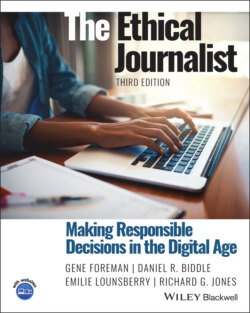Читать книгу The Ethical Journalist - Gene Foreman - Страница 25
Ethics in a Time of Change
ОглавлениеIn this turbulent environment, standards are still being forged for digital journalism. The decision process typically is about a feverish rush to post a news story before someone else does, or about an expedient solution to a shortage of staff or some other money‐related problem. Collectively, whether they realize it or not, the decision‐makers are creating a template for the future of journalism.
In the midst of so much change, we hear arguments that our professional principles must radically change as well.
To the contrary, this textbook contends that it is precisely in a period of technological transition that we should adhere to time‐honored principles.
“Ethical standards can’t be tailored to a specific delivery medium,” said Bill Marimow, former editor of The Philadelphia Inquirer. “Doing the right thing can’t be based on whether you’re reporting in print, on broadcast, or online.”16 Maureen Dowd of The New York Times wrote in a 2013 column emphasizing the importance of content over news‐delivery medium: “It is not about pixels versus print. It is not about how you’re reading – it is about what you’re reading.”17
Of course, journalism ethics evolves, as the profession demonstrated in formulating the newsroom ethics codes that proliferated during the second half of the twentieth century. That evolution continues in the digital age, but the evolutionary process is most successful if it is based on collaboration and shared experience, and if it reflects logic rather than reflex.
Unquestionably the new technology has brought new ethics challenges. In the old order, there was nothing like social media, in which journalists participate both as professionals and as private citizens. Still, traditional standards can guide us. For example, social media make it easier for journalists to gather facts and images from citizens who have witnessed and possibly photographed breaking news. But the time‐honored standard of verification still applies.
Irrespective of how the news is delivered, journalism still rests on three principles enunciated in The Elements of Journalism by Bill Kovach and Tom Rosenstiel: First, it is an independent act of gathering and disseminating information. Second, the practitioner owes first loyalty to the citizens who consume the news. Third, the practitioner is dedicated to truth‐seeking and a discipline of verification.
In the view of this textbook’s authors, those broad principles define journalism.18 The definition could serve as a job description for people who aspire to be journalists, provided they are committed to meeting the high standards that the definition implies. Such a person could be a staff member of a mainstream online, broadcast, or print organization – or a citizen blogger or Twitter user or anyone else who purports to report and comment on the news, even as a hobby.
This textbook’s purpose is to identify, discuss, and teach the ethics standards that dedicated journalists live by.
